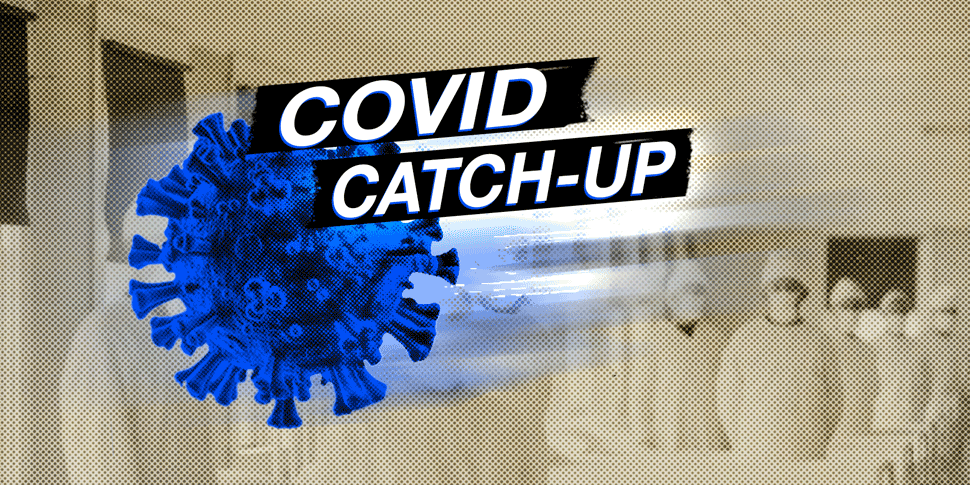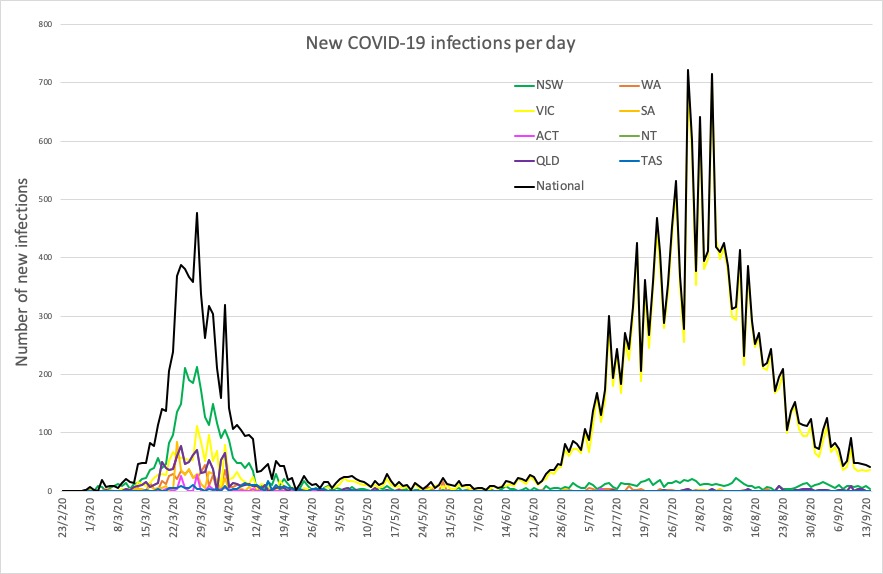Billions of dollars spent on pandemic prevention and preparedness are worth trillions of dollars in avoided costs, report says.
Welcome to The Medical Republic‘s COVID Catch-Up.
It’s the day’s COVID-19 news in one convenient post. Email bianca@biancanogrady.com with any tips, comments or feedback.
15 September
- Spending billions on pandemic preparedness could have saved trillions, report says.
- Concerns raised about data duplication in Russian COVID-19 vaccine study.
- NSAIDs use in COVID-19 not linked to increased mortality, hospitalisation or risk of ventilation.
- BMJ and BMA create memorial page for UK doctors who have died from COVID-19.
- The latest confirmed COVID-19 infection numbers from around Australia.
- An ounce of prevention is worth a pound of cure. Or, to put it in a contemporary context, billions of dollars spent on pandemic prevention and preparedness are worth trillions of dollars in avoided costs.
So says the Global Preparedness Monitoring Board – an independent monitoring and accountability organisation focused on global health crises and founded in 2017 – which has just released its latest report titled ‘A World in Disorder‘.
Like for a child that hasn’t handed in a single piece of homework all year, this report was never going to deliver an A+. The GPMB estimated that the cost of the COVID-19 pandemic so far – more than US$11 trillion – could have paid for 500 years’ worth of appropriate planning and preparedness.
The report is steeped in disappointment that previous warnings about this lack of preparedness had not been heard or heeded. “The Board concludes that little progress has been made on any of the actions called for in last year’s report and that this lack of leadership is exacerbating the pandemic,” the report’s authors wrote. “Failure to learn the lessons of COVID-19 or to act on them with the necessary resources and commitment will mean that the next pandemic, which is sure to come, will be even more damaging.” - A group of scientists have raised concerns about possible data duplication in the Russian COVID-19 vaccine study published last week in The Lancet.
An open letter written by Enrico Bucci – a systems biologist and bioethicist at Temple University – and co-signed by nearly 40 scientists from around the world, highlighted data patterns that appear to be repeated across the paper.
For example, a group of nine patients given one of the vaccines all appeared to have identical antibody titres at 21 and 28 days.
Speaking to Chemistry World, Bucci said the values for CD4 T cell measurements in one group of volunteers were almost the same as the CD8 T cell measurements for another group of volunteers. Bucci also said the study was underpowered because it tested six different formulations across six groups of volunteers. He noted that while the Oxford vaccine trial provided over 100 pages of supplementary material to support its Lancet paper, the Russian paper only included 22 pages and there wasn’t enough data to verify the paper’s conclusions.
According to Chemistry World, The Lancet has invited the study’s authors to respond to the open letter and is monitoring the situation. - Non-steroidal anti-inflammatory use does not appear to be associated with increased COVID-19 mortality, hospitalisation or worse outcomes, according to a population-based study from Denmark.
The study, published in PLOS Medicine, used administrative and health registry information to examine outcomes in 9,236 SARS-CoV-2 PCR-positive individuals, 2.7% of whom had filled a prescription for NSAIDs up to 30 days before testing positive. Those who had an NSAIDs prescription were matched to up to four non-users, based on age, sex, relevant comorbidities, other prescription drug use and phase of the outbreak.
Researchers saw no significant differences between users and non-users in 30-day mortality or risk of hospitalisation, intensive care, mechanical ventilation or renal replacement therapy. However there was a significant 55% higher risk of hospitalisation among female users of NSAIDs compared to non-users, but this was not seen among male users. - The BMJ and British Medical Association have created a memorial web page for UK doctors who have died from COVID-19. There are 34 names so far on the memorial, but the page’s authors acknowledge that this is not an exhaustive list.
“No one should have to risk their lives or health because of their work, and we honour those who have paid this ultimate sacrifice,” wrote BMJ editor-in-chief Fiona Godlee, while British Medical Association council chair Dr Chaand Nagpaul acknowledge the high proportion of Black, Asian and minority ethnic (BAME) individuals in the ranks of those who died.
“The vast majority who have sadly died are from a BAME background, with many coming from overseas to contribute their valuable skills and expertise to the NHS to save the lives of others, only to tragically lose their own,” he wrote. - Here are the latest confirmed COVID-19 infection numbers from around Australia, to 9pm Monday:
National – 26,692 with 816 deaths
ACT – 113 (0)
NSW – 4170 (4)
NT – 33 (0)
QLD – 1149 (0)
SA – 466 (0)
TAS – 230 (0)
VIC – 19,872 (35)
WA – 659 (0)



